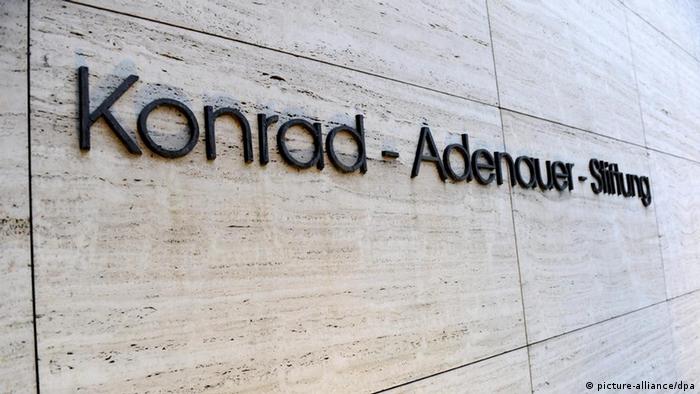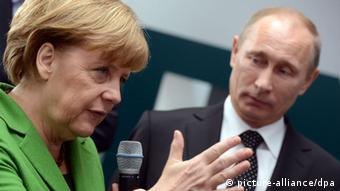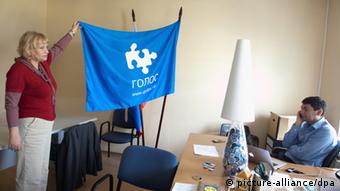One month ago, German political foundations were searched by Russian public prosecution, triggering a wave of criticism in Berlin. The foundations haven't had any problems since, but they're worried for their partners.
Lars Peter Schmidt was surprised when the German Konrad Adenauer Foundation (KAS) received "a lot of solidarity" from Russian media, all the way from the private newspaper Kommersant to state-owned news agency RIA Novosti. It was the first time in 20 years. "I thought that was rather remarkable," Schmidt told DW. Schmidt is the head of the Moscow bureau of the political foundation, which has close ties with Angela Merkel's conservative party, the CDU. The Russia media were responding to events that occurred a month ago.
Routine investigation or interference?
At 10 a.m. on Tuesday, March 26th, 2013, two men entered the regional KAS office, situated on Nevsky Prospekt in St Petersburg. Two days earlier, the office had received a letter from the public prosecutors with 20 questions about the foundation's activities in areas ranging from accounting to internet presence. Schmidt said KAS answered the questions and considered the matter settled. That's why the St Petersburg staff were all the more astonished when the Russian officials appeared and took all the computers with them, saying they had to check the software licenses.
Berlinreacted with a wave of criticism. Germany's Foreign Office "invited" the Russian ambassador for talks. A day later the computers were returned. But the incident was not the only one. Around the same time, the Moscow bureau of the Friedrich Ebert Foundation (FES), which has ties with the German center-left opposition party, the SPD, was also searched by officials from the public prosecution service. But no computers were confiscated. Russian authorities spoke of a routine search with no particular reason. When German Chancellor Angela Merkel met Russian president Vladimir Putin in Hanover in early April, she called the incidents acts of "interference" and called on the president to show more restraint.
'Who cooperates with whom where'
Four weeks after the visits, it's rather quiet around the German political foundations in Russia. "There's no actual interference," Schmidt told DW. But the feeling of astonishment is still there. Never before have German political foundations in Russia been subject to this kind of a wave of thorough searches by the public prosecutors, he said. "It was indeed a category of interference which is hardly acceptable," Schmidt said of the confiscated computers. Some of the material stored on the disks, according to him, consisted of communication with partner organizations and with KAS headquarters.
He sees a connection between the action against KAS and FES and a new law which regulates the work of Russian non-governmental organizations. The law stipulates that Russian NGOs have to register as "foreign agents" if they receive money from abroad and are politically active. The concerned NGOs refuse to comply, saying that the term puts them under suspicion. Authorities are therefore checking hundreds of NGOs in Russia at the moment. "They want to get a clear picture of who cooperates with whom where," said Schmidt.
Different approaches in Russia
Six German political foundations operate in Russia: as well as KAS and FES, there's the Heinrich Böll Foundation, linked with the Green Party, the Friedrich Naumann Foundation of the pro-business FDP, the Hans Seidel Foundation of the CDU's Bavarian sister party, the CSU and the Rosa Luxemburg Foundation, which is close to the Left Party. They don't have any problems in Russia, their representatives answered when asked by DW. "We haven't experienced anything of that kind," said Markus Ehm from the Hans Seidel Foundation.
But then the different political foundations work differently in Russia. Some organizations like the Böll foundation support Russian partners financially. The Naumann foundation and Seidel foundation, on the other hand, don't give money to Russian NGOs. Instead, they organize meetings of politicians, conferences and seminars.
Partner organizations are worried
But there is indirect interference in their work. Schmidt says, "What we are experiencing is that the work for political foundations is not getting easier." Russian partners have voiced concerns that they could "cause suspicion of some kind" when cooperating with foreign foundations. That's why many of them keep a low profile, Schmidt said.
Julius von Freytag-Loringhoven of the Naumann Foundation agrees: "We are noticing that our partners are insecure. They always ask twice whether it's even possible to cooperate with a foreign organization." He told DW that he has noticed this behavior in particular with new partners who are worried about "being stigmatized as foreign agents."
Jens Siegert, the head of the Böll foundation, said he didn't notice any kind of restraint by Russian partners, but he did confirm that there was indirect interference. Russian NGOs, he said, were busy dealing with the investigations by the state prosecution. "That means a lot of work and it keeps them from doing any content-related work," said Siebert.
Hope that the Kremlin will see reason
Against that background, the future of German political foundations in Russia is unclear. For now, all interviewees agreed that they'll continue as normal. “The Naumann foundation does have the wish to cooperate with Russia,” said Freytag-Loringhoven, adding that he was concerned for his Russian partners and that he hoped that "the mood will not deteriorate."
Schmidt of KAS doesn't exclude the possibility that programs in Russia could get less financial support from Germany: "In an atmosphere where political foundations are being pushed into the corner of espionage, we can't work properly any more - even if we still consider Germany and Russia to be partners." Nothing has been decided yet: all hopes, he says, are now on "the Kremlin seeing reason." dw de



Comments